Michael F. Blake spent sixty years in the film and television industry before his retirement in 2018. A two- time Emmy-winning makeup artist, his credits include Westworld , X-Men: First Class , Spider-Man 3 , Independence Day , Tough Guys , Soapdish , Police Academy II , The Munsters Revenge , and Happy Days . As a child actor, Michael appeared in such television shows as Adam-12 , The Lucy Show , The Munsters , Bonanza , Kung Fu , The Red Skelton Show, and Marcus Welby, MD.
A respected film scholar with a masters degree from UCLA, Michaels three books on silent screen legend Lon Chaney are the definitive works on the actor. His trilogy served as the basis for the Turner Classic Movies documentary Lon Chaney: A Thousand Faces (2000), in which he was a special consultant and on-camera interviewee. Michaels two books, Code of Honor: The Making of High Noon , Shane, and The Searchers and Hollywood and the O.K. Corral , have been recognized as important works about the Western genre.
The Cowboy President: The American West and the Making of Theodore Roosevelt has been praised for showing a side of the man few people knew. True West magazine named it their best political biography for 2018, and it was nominated for a Spur Award for best biography by Western Writers of America.
Michael has provided audio commentary for several Lon Chaney films, and has appeared in documentaries about John Ford, Irving Thalberg, and Max Factor. His articles have appeared in Wild West , American Cinematographer , True West , Round-Up, and the Los Angeles Times . In 2017 he was awarded the Western Writers of America Stirrup Award for his article about the making of The Searchers .
Michael lives in Arizona with his wife, Linda, and their dogs.

GO WEST, MR. PRESIDENT
To Kim,
my daughter, my friend,
and to
Abigail Cannon,
the best granddaughter a guy could have
A TWODOT BOOK
An imprint and registered trademark of The Rowman & Littlefield Publishing Group, Inc.
4501 Forbes Blvd., Ste. 200
Lanham, MD 20706
www.rowman.com
Distributed by NATIONAL BOOK NETWORK
Copyright 2020 Michael F. Blake
All rights reserved. No part of this book may be reproduced in any form or by any electronic or mechanical means, including information storage and retrieval systems, without written permission from the publisher, except by a reviewer who may quote passages in a review.
British Library Cataloguing in Publication Information available
Library of Congress Cataloging-in-Publication Data
Names: Blake, Michael F. (Michael Francis), 1957-author.
Title: Go West, Mr. President : Theodore Roosevelts Great Loop Tour of 1903 / Michael F. Blake.
Other titles: Theodore Roosevelts Great Loop Tour of 1903
Description: Helena, Montana : TwoDot, [2020] | Includes bibliographical references and index.
Identifiers: LCCN 2020001761 (print) | LCCN 2020001762 (ebook) | ISBN 9781493048465 (hardcover) | ISBN 9781493048472 (e-book)
Subjects: LCSH: Roosevelt, Theodore, 1858-1919TravelWest (U.S.) | PresidentsTravel West (U.S.)--History--20th century. | West (U.S.)Description and travel.
Classification: LCC E757 .B6483 2020 (print) | LCC E757 (ebook) | DDC 917.804/0904dc23
LC record available at https://lccn.loc.gov/2020001761
LC ebook record available at https://lccn.loc.gov/2020001762
 The paper used in this publication meets the minimum requirements of American National Standard for Information SciencesPermanence of Paper for Printed Library Materials, ANSI/ NISO Z39.48-1992.
The paper used in this publication meets the minimum requirements of American National Standard for Information SciencesPermanence of Paper for Printed Library Materials, ANSI/ NISO Z39.48-1992.
Contents
Guide
Newspapers covered every aspect of Theodore Roosevelts presidency from his filing of the Sherman Antitrust lawsuit against the Northern Securities Company, to his Mississippi bear hunt, to his last day in office. Theodore made, in newspaper parlance, good copy.
I have relied on the numerous 1903 newspapers that covered all or part of Theodores Great Loop Tour, from the big city presses like the New York Times and the Washington, DC, Evening Star , to small- town papers. Local papers provided more personal insights into his visit as compared to the larger papers or press syndicates like the Associated Press. After all, how many small towns can boast that theyve had a visit from the president of the United States?
One aspect of these newspaper articles that I found particularly fascinating was the way the reporters crafted their stories. Their words flowed with a style that brought to mind the characters in the play and movie versions of The Front Page . One particular story was about a man who attempted to assassinate Theodore. The reporter noted that the police arrested him and sweated him. No writer today could equal such expository description.
The reader may find some of the comments quoted from the newspapers of the time to be particularly insensitive by todays standards, but these comments were wholly acceptable in 1903. As a historian, I have chosen not to edit them. Whether we like it or not, they are part of history.
Bully!
According to Websters Unabridged Dictionary , the definition of this word means fine; excellent; very good; a more informal definition is well done.
No other single word has been so readily identified with a U.S. president than bully with Theodore Roosevelt. The word fit perfectly the man and his life. He used it to describe anything that pleased or entertained him. The American public took to using the word to express their delight; even newspapers occasionally used the word in reference to anything relating to Theodore.
By the end of 1901, a scant three months after Theodore assumed office as the youngest president of the United States at age forty- two, the American publicnot to mention Washington, DCcame to realize that the new man in the White House was not a typical commander in chief. Theodore Roosevelt quickly stepped into this leadership role with a gusto never before experienced. It was said that when Theodore entered a room, it was like a cyclone blowing in. His magnetic personality overshadowed anyone else in the room. His full mustache sat above a broad grin that bared his even, white teeth, and his blue eyes sparkled behind his glasses. Even those who disagreed with his policies could not help but admire the man; many grudgingly admitted to liking him.
One group that loved Theodore was newspaper correspondents. Although they may have disagreed with his administration on various things, they love[d] him for the copy he has made! Theodore learned early in his public service career that making friends with newspaper reporters was not only smart but necessary. During the Spanish-American War, reporters gave him and his Rough Riders more coverage than the army during the fighting in Cuba. The press turned Theodore into a national hero and helped pave his way to the White House. Once inside the Executive Mansionit was Theodore who renamed it the White Househe continued to cultivate relationships with the press but was not afraid to take them to task if he felt they were wrong. Political cartoonists loved him, as well, since Theodore provided them a never-ending wealth of material.

In 1903, Theodore planned a tour of the midwestern and western states, which he was careful to avoid calling a campaign tour, even though he intended to seek reelection the following year. Theodore was adamant that his speeches be devoid of any partisan rhetoric nor would he meet solely with Republican officeholders in the various cities and towns. He happily shook hands with Democratic mayors or senators, just as he would Republicans. Theodores speeches, which he wrote himself, covered subjects of good citizenship, a square deal for every man, a strong navy, and the positive aspects of the irrigation bill he had recently signed into law. Then there were his speeches relating to conservation of the land, forests, rivers, and wildlife. Nowhere did these subjects become more important to him than when he visited Yellowstone, the Grand Canyon, and Yosemite. Still three years away from enacting the law that would anoint him the conservationist president, Theodore already was making his mark by preserving the countrys resources.


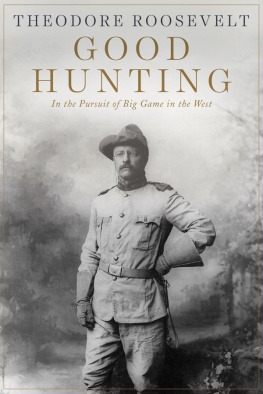
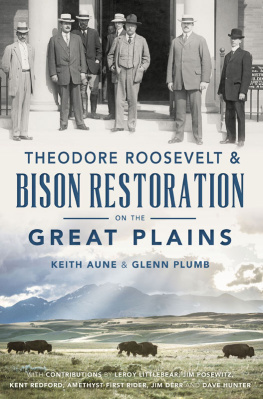
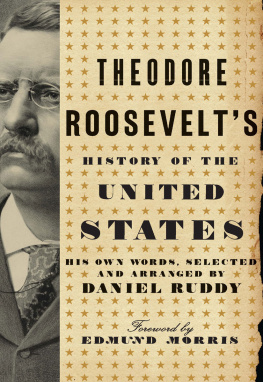
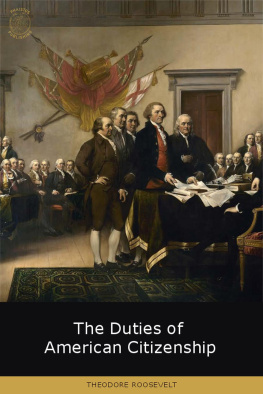
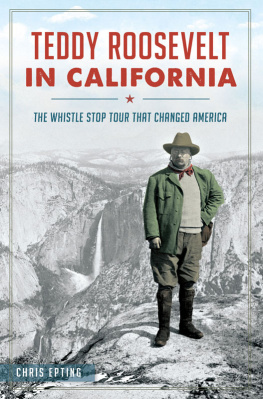
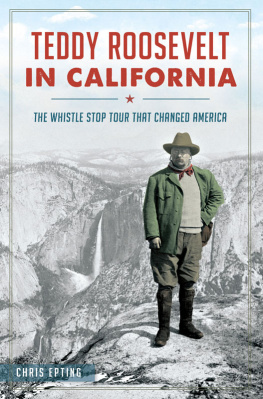
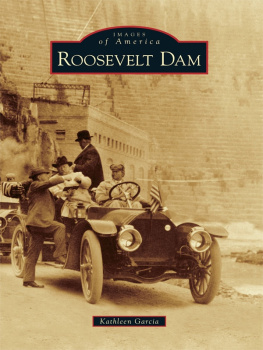
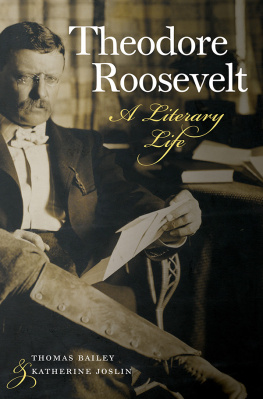
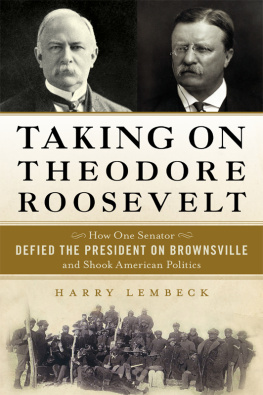

 The paper used in this publication meets the minimum requirements of American National Standard for Information SciencesPermanence of Paper for Printed Library Materials, ANSI/ NISO Z39.48-1992.
The paper used in this publication meets the minimum requirements of American National Standard for Information SciencesPermanence of Paper for Printed Library Materials, ANSI/ NISO Z39.48-1992.